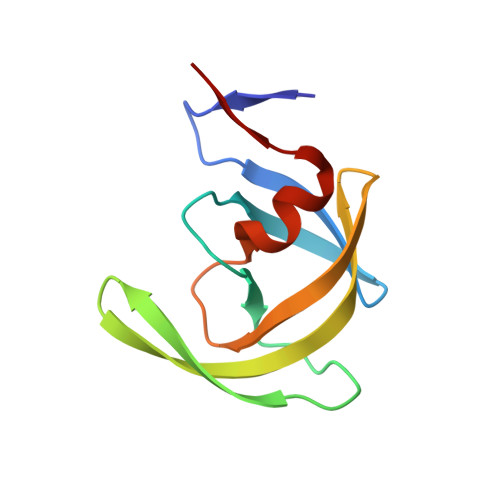Picomolar to Micromolar: Elucidating the Role of Distal Mutations in HIV-1 Protease in Conferring Drug Resistance.
Henes, M., Lockbaum, G.J., Kosovrasti, K., Leidner, F., Nachum, G.S., Nalivaika, E.A., Lee, S.K., Spielvogel, E., Zhou, S., Swanstrom, R., Bolon, D.N.A., Kurt Yilmaz, N., Schiffer, C.A.(2019) ACS Chem Biol 14: 2441-2452
- PubMed: 31361460
- DOI: https://doi.org/10.1021/acschembio.9b00370
- Primary Citation of Related Structures:
6OPS, 6OPT, 6OPU, 6OPV, 6OPW, 6OPX, 6OPY, 6OPZ - PubMed Abstract:
Drug resistance continues to be a growing global problem. The efficacy of small molecule inhibitors is threatened by pools of genetic diversity in all systems, including antibacterials, antifungals, cancer therapeutics, and antivirals. Resistant variants often include combinations of active site mutations and distal "secondary" mutations, which are thought to compensate for losses in enzymatic activity. HIV-1 protease is the ideal model system to investigate these combinations and underlying molecular mechanisms of resistance. Darunavir (DRV) binds wild-type (WT) HIV-1 protease with a potency of <5 pM, but we have identified a protease variant that loses potency to DRV 150 000-fold, with 11 mutations in and outside the active site. To elucidate the roles of these mutations in DRV resistance, we used a multidisciplinary approach, combining enzymatic assays, crystallography, and molecular dynamics simulations. Analysis of protease variants with 1, 2, 4, 8, 9, 10, and 11 mutations showed that the primary active site mutations caused ∼50-fold loss in potency (2 mutations), while distal mutations outside the active site further decreased DRV potency from 13 nM (8 mutations) to 0.76 μM (11 mutations). Crystal structures and simulations revealed that distal mutations induce subtle changes that are dynamically propagated through the protease. Our results reveal that changes remote from the active site directly and dramatically impact the potency of the inhibitor. Moreover, we find interdependent effects of mutations in conferring high levels of resistance. These mechanisms of resistance are likely applicable to many other quickly evolving drug targets, and the insights may have implications for the design of more robust inhibitors.
Organizational Affiliation:
Department of Biochemistry and Molecular Pharmacology , University of Massachusetts Medical School , Worcester , Massachusetts 01605 , United States.
















